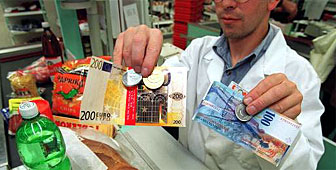Tourists to flood Switzerland with euros

When Switzerland's neighbours change their currencies to the euro in six months' time, Swiss tourist resorts will be the first to feel the effects. Preparations are in full swing.
In the past, Switzerland has liked to think of itself as a rocky island in a restless sea. When the French and Hapsburg monarchies bickered over hegemony in Europe in the late Middle Ages, the Swiss fought tooth and nail for the preservation of their autonomous chiefdoms. In the 20th century, Switzerland refused to commit itself to military alliances or the European Union.
From January 2002, that insular feeling will become tangible for the first time in decades as 12 EU member states, including all of Switzerland’s immediate neighbours, will introduce the next stage of European Monetary Union (EMU) and replace their separate banknotes with the euro variety, while Switzerland sticks to its franc.
But for the first time, Swiss independence may be in jeopardy. Some experts predict that the Swiss island will be flooded, if not submerged and annihilated in the long run, with euro banknotes.
Tourists dangerous agents
The most unassuming but dangerous agents in the process are foreign tourists, together with their allies in Switzerland’s tourist industry. Leakages in the dyke that shores up the Swiss franc will occur first in the country’s resorts, where experts will gauge the “damage” – the change in the behaviour of Swiss citizens confronted with the euro.
Not that many Swiss seem to feel uneasy in loosing the ground under their feet currency wise. “It’s an advantage to us”, says Thomas Frei, the owner of a four-star hotel in Gstaad, an up-market resort 40 kilometres south of Bern. “With the euro, we’ll have to deal with one foreign currency instead of a dozen.”
Preparations to accommodate foreign visitors who prefer to pay their bills in euros are well underway. Like most of his colleagues, Frei has begun to advertise accommodation prices in euros as well as francs since the common European currency was introduced as book money in 1999.
When the first physical euro banknotes appear next January, Frei will accept actual payment in euros too. “All hotels, restaurants and major shops will allow payment in euros”, predicts Eduardo Zwyssig, marketing director of the Gstaad tourist board.
The largest of the Swiss banks will introduce automatic teller machines that issue euro banknotes. Petrol stations will adjust their automatic tellers to accept the money.
Hotels should adopt fixed rate
The Swiss Hotel Association (SHA) recommends that hotels adopt a fixed seasonal exchange rate of 1.53 Swiss francs to the euro when advertising prices, but write out bills on the basis of daily exchange rates. “It’s not customer friendly if hotels let tourists bear the exchange rate risk”, explains Brigitte Zaugg, the SHA’s economic policy adviser.
Since it was introduced by 11 EU countries (Austria, Belgium, Finland, France, Germany, Ireland, Italy, Luxemburg, Netherlands, Portugal, Spain), the euro has depreciated against the Swiss franc. Since the beginning of this year, it has fluctuated at between 1.50 and 1.54 SFr.
The Swiss tourist industry is not only hoping to please visitors when adjusting to the new euro currency. It is also keen to seize the opportunity of shedding what Zwyssig calls the “annoying image” of being overly expensive. “Tourists will be able to compare our prices directly with those in most other European countries and find out that we are price competitive,” Zwyssig hopes.
But operators in or close to the tourist sector disagree to what extent resorts will be swamped with the currency. “It’ll become common before long for Swiss citizens to pay their restaurant bills in euros as well”, says Kurt May, manager of the Gstaad branch of a regional bank.
But hotel owner Frei thinks nothing much will change in practice. “The huge majority of customers pay their bills by credit card anyway.”
Moreover, most hotel and shop owners say they will not give out change in the new currency for the time being, especially when it comes to coins. “Euro coins are not going to be popular”, May agrees.
Vending machines and small shops will stay geared to the Swiss franc, meaning tourists will still have to distinguish between the different shapes and sizes of coins and the exchange rate. “I won’t accept euros”, vows Gabi Sumi, the licence holder of a newspaper stand in the village centre of Gstaad.
As to the long-term effects on the behaviour of the Swiss, self-appointed experts are having a field day. Received wisdom has it that the euro will become a parallel currency, putting Switzerland on a par with Canada whose citizens often carry American as well as Canadian dollar banknotes.
North American parallel
Some reports in the media say the threat to the Swiss franc is as great, because Switzerland is almost fully integrated into the European economy, as Canada is in the American.
The reports point to the fact that some export-oriented sectors of the economy, like the machine industry, are already paying their suppliers in euros, and they expect individuals will follow enterprises in opening euro accounts with their banks.
“Once a certain critical mass in euro exchanges has been reached, we Swiss are going to get accustomed to paying in euros for a meal in a restaurant, say, or a beer at a café, I’m sure of it”, says May, a happy follower of the school of thought that sees the euro currency encroaching on Swiss territory from all sides – with tourist resorts its bridgehead.
But Andreas Höfert, a macro-economic analyst with UBS Warburg, thinks that expectations, or fears as the case may be, are exaggerated. “The euro will be no more of a parallel currency than the German mark or French franc before it”, he says. “The only incentive for people living and working in Switzerland to keep euro money lies in their spending it across the border in Austria, Germany, France or Italy.”
Höfert thinks much will depend on how well the currency changeover in the EU will be managed, and whether the euro will prove to be a popular and stable currency. If technical and administrative glitches occur, as many expect, or if the euro will depreciate further, Höfert expects a rise in the prestige of the Swiss franc.
But even if the euro is a success, the Swiss franc remains the only “legal” currency, enshrined in the Swiss constitution. Since nobody can be forced to bear the exchange rate risk inherent in currency transactions, creditors and debtors will continue to settle their debts in the local currency, while employers will equally carry on paying their employees in francs.
In tourist resorts and in urban areas along Switzerland’s border with its EU neighbours, the Euro currency will probably be a common sight. But unless the Swiss vote to give up their currency for the euro – a decision not on the cards at present – the dyke that protects the Swiss franc will hold.
by Markus Haefliger

In compliance with the JTI standards
More: SWI swissinfo.ch certified by the Journalism Trust Initiative









You can find an overview of ongoing debates with our journalists here . Please join us!
If you want to start a conversation about a topic raised in this article or want to report factual errors, email us at english@swissinfo.ch.